No More Sad Things
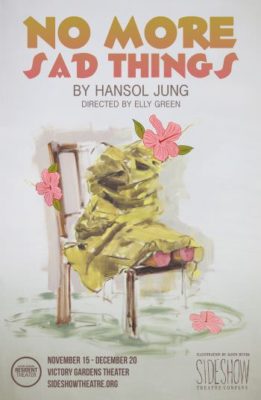 By Hansol Jung
By Hansol Jung
Directed by Elly Green
Produced by Sideshow Theatre Company
Playing at Victory Gardens, Chicago
A Love That Was Not Meant To Be
The key to a love story is that the audience has to want the relationship to work. Even if a couple ends in tragedy, there has to be a sense that the risk they took was worth it, or at least, that the couple could plausibly think so. No More Sad Things, a new play by Korean-born author and musical translator Hansol Jung, currently in a co-world premier with Sideshow Theatre Company and the Boise Contemporary Theater, has an amazing abstract set design by William Boles, which recalls the waves of the Pacific ocean, and is well-directed by Elly Green. It’s too bad the main character is so detestable, and the other two actors have so little to work with.
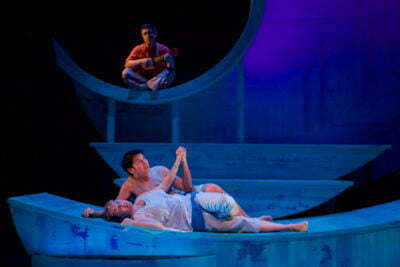
We open with the Guidebook (Narciso Lobo) reminding us that the curved platforms we are looking at are “a stage, or, our collective deep, dark, weird dreams.” Jessiee, spelled with two e’s (Katy Carolina Collins), a thirty-two year old of Akron, dreams that her house is infested with frogs, and when she has them exterminated, the sole surviving tadpole directs her to go to Maui. Meanwhile in Maui, Kahekili (George Infantado) dreams that he takes the place of a star, which falls to the beach, and tells him to pursue it. Both of them have been very unhappy lately. Kahekili’s father turned to drink after an accident ruined his dreams of surfing competitively, and is now a depressing, useless presence around the house. Jessiee’s doting, super-religious mother got cancer and had to get her legs amputated, but is still sickly and depressed, and getting worse. Not in the mood to sit around waiting for her to die, Jessiee gets on a plane to Maui, hoping to put behind the sad part of her life.
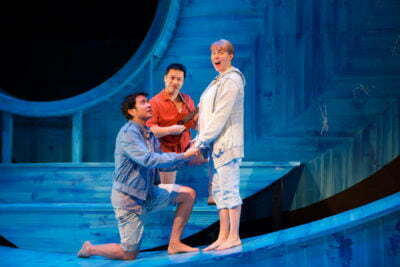
After regaling us with how she changed tampons without having to leave her seat on the plane, Jessiee arrives in Hawaii and takes a late-night stroll to Ka’anapali beach. There, she encounters Kahekili, who becomes curious about her after she throws her phone in the ocean. She’s attracted to him despite not being able to see him clearly, since his Pidgin speech and working-class Hawaiian outlook are so different from what she’s used to. She puts on a show of hostility at first, then flirts with him, and they have sex. Afterwards, he informs her that he’s fifteen. Jessiee is horrified and retreats to her hotel room, where she reminisces on how her boyfriend got her pregnant as a teenager, and her mother pressured her to get an abortion. Unhappy with the memory, and with the front desk incessantly reminding her of emergency calls from Akron she’s pointedly ignoring, Jessiee eventually goes out again to resume a relationship with Kahekili. She refuses to have sex with him for the time being, but she does introduce him to alcohol, and the boy, quite smitten asks her to marry him. She is not at all pleased that he doesn’t grasp the situation.
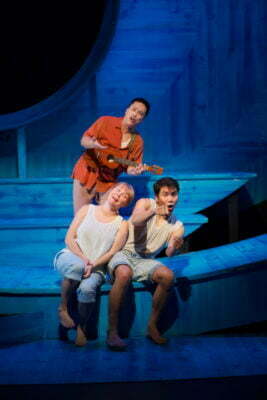
I find the play’s apparent sympathy with Jessiee incomprehensible, and Collins’s alternatingly melancholy and frantic portrayal doesn’t do much to improve her. She panicked for a moment when she thought Kahekili had drowned, and she was worried about menstruating on the passenger next to her on the plane, but she lacks a decent amount of concern for the feelings of others. No matter how much she resented her mother’s (presumably hypocritical) pressuring her to get an abortion, that doesn’t justify abandoning her on her deathbed. George Infantado plays Kahekili with a thick Hawaiian accent and dialect. The character is simple, innocent, and uneducated, which he captures, but not especially compelling. I wanted him to run from Jessiee at their first meeting. Lobo plays a number of other characters and provides a ukulele accompaniment. The guidebook’s interjections are meant to be humorous in an annoying way, but as Jessiee’s previous lover, who wanted to have a child and was deeply hurt by her decision, he could have provided a lot more depth.
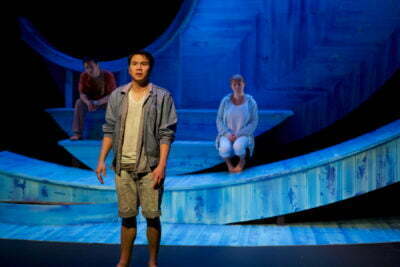
To Jung’s credit, she doesn’t pretend this is a relationship that could or should last. I suppose she takes it for granted that she doesn’t need to point out how exploitative it is, either. There were some moments that are genuinely funny, and it’s possible that other people might find something wistful in the more poetic moments of her writing. Perhaps the tone was off; I could buy No More Sad Things as a gritty drama set in the dark side of paradise about people who turn ugly under stress and lack of responsibility, similar to Hunter Thompson’s The Rum Diary. But that’s the opposite of this production’s vision.
Somewhat Recommended
Jacob Davis
[email protected]
Reviewed November 19, 2015
This show has been Jeff recommended.
For more information, see No More Sad Things’ page on Theatre in Chicago.
Playing in the Victory Gardens Richard Christiansen Theater, 2433 N Lincoln Ave, Chicago. Tickets are $20-30 with discounts for students, seniors, and industry. To order, call 773-871-3000 or visit victorygardens.org. Performances are Thursdays (except November 26), Fridays, and Saturdays at 7:30 pm and Sundays at 3:00 pm through December 20. Running time is eighty minutes with no intermission.
